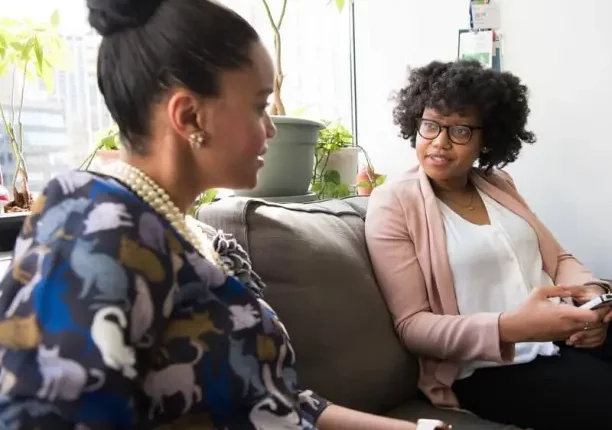Lifestyle-Health
Why “we need to talk” may be a good sign

Have you ever received a message that simply says, “Hey, we need to talk?” For many, this phrase instantly triggers a stressful response—your mind wanders to the last conversation, wondering what went wrong, or worries about what’s coming next. It is completely human to feel overwhelmed and anxious when faced with ambiguity, especially when everything seemed fine a few moments before.
But here’s a perspective worth considering: What if “We need to talk” is a positive sign?
Often, when someone initiates a conversation like this, it signals that they feel emotionally safe enough with you to be honest. They’re coming to you—because they can. When people stop talking, that’s when concern should rise. Silence can be far more damaging than the discomfort of a hard conversation.
In many cases, “We need to talk” reflects care. It’s a way of saying, “Our relationship matters to me enough that I’m willing to be vulnerable.” This is something to hold with care, even when what’s being said is hard to hear.
That said, receiving feedback—especially about how we show up in relationships—can bring up a fold of discomfort, self-doubt, or even shame. A common response is to move quickly into problem-solving: “I won’t share like that again,” or “Next time, I’ll just stay quiet.” These reactive decisions often stem from a desire to avoid pain, but they don’t help the relationship grow; they only lead to repeating ruptures.
Early family therapists at the Mental Research Institute (MRI) in Palo Alto, California, developed a brief therapy model focused on helping families shift the patterns they use to solve problems. They observed that many families unintentionally maintain or worsen their issues by repeatedly using the same ineffective solutions. This phenomenon was described by MRI therapists as “more of the same”. According to their approach, real change occurs not by directly treating the problem itself, but by interrupting and changing the attempted solutions that are sustaining it (Rohrbaugh, 2018). In other words, if the way a family is trying to fix a problem is part of the problem, then doing something different is the key to transformation.
If anxiety or fear of loss is guiding your response, you might fall back into self-protective behaviors that keep you distant, guarded, or overly accommodating. While understandable, these reactions can undermine your relational goals. Healthy relationships require shared effort in co-creating understanding, not just relying on individual coping mechanisms.
So the next time you receive that dreaded “We need to talk” text, consider it an invitation rather than a warning. Someone is choosing to repair, clarify, or connect with you—not walk away. In these moments, the goal isn’t to defend or to fix immediately, but to listen deeply. Focus on what the other person is saying about their experience. Resist the urge to prioritize how you felt about how they said it (unless it fosters harm).
Here’s one helpful approach: After the conversation, write down what you heard. Identify three feelings or themes they expressed. When you revisit the conversation or send a follow-up message, start by acknowledging those feelings. Show that you heard them, that you understand something about their experience. That kind of attuned reflection builds trust.
Then you can collaboratively explore what needs to happen next—for both of you. Because “We need to talk” isn’t just a sign of trouble, it’s a sign that someone still believes the relationship is worth the effort.
-

 Lifestyle-Health7 months ago
Lifestyle-Health7 months agoInvesting ₹10,000 a month via SIP in this mutual fund would have swelled to ₹1.71 crore in 21 years. Check how
-

 Lifestyle-Health7 months ago
Lifestyle-Health7 months agoMultibagger small-cap stock under ₹50 jumps despite sell-off in Indian stock market
-

 Breaking News4 months ago
Breaking News4 months agoIsrael Names 77 Countries That Boycotted Netanyahu’s UN Speech In Protest Over Gaza War
-

 News In Diaspora7 months ago
News In Diaspora7 months agoHotels and homes on Crete evacuated as wildfire burns out of control
-

 Lifestyle-Health8 months ago
Lifestyle-Health8 months agoOgie Alcasid’s daughter Leila ties the knot in Australia
-

 Lifestyle-Health8 months ago
Lifestyle-Health8 months agoDriving Abroad: These 34 countries accept SA licenses
-

 Politics8 months ago
Politics8 months agoFinally Federal Government of Nigeria Assures Citizens, Says The President Isn’t Controlled by Any Cabal
-

 Lifestyle-Health5 months ago
Lifestyle-Health5 months ago11 signs of growth that you might have missed
-

 Lifestyle-Health8 months ago
Lifestyle-Health8 months ago10 Unwritten Rules for Visiting Bali that Travelers Should Know
-

 Breaking News5 months ago
Breaking News5 months agoVeteran actress, Peju Ogunmola, loses only child, Ayomikun
-

 Lifestyle-Health6 months ago
Lifestyle-Health6 months agoWhen to take time off and focus on yourself and your family
-

 Breaking News7 months ago
Breaking News7 months agoNeymar’s Net Worth in 2025: Football Career, Earnings, Endorsements, and More

